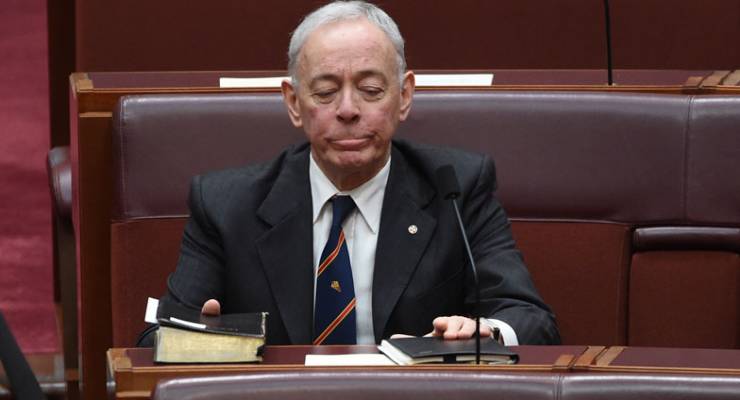
While Family First Senator Bob Day keeps everyone guessing with his is-my-position-tenable-or-is-it-not dance of the seven resignation tweets, there’s a more serious issue in the background — a question over whether he should be in the Senate at all, given his financial situation.
Day says, in relation to his Home Australia property development and construction group of companies, he’s been scrupulous in complying with the prohibition on trading while insolvent, and there’s certainly no reason to doubt that.
However, at the same time he also stated about the liquidation process for Home Australia: “As I have always agreed to sign personal guarantees to creditors, this closure also has serious implications for me and my family. Creditor liabilities greatly exceed our assets so we will also lose our family home.” So according to Day himself, he lacks the assets to cover his liabilities, and presumably has done so for some time, since before the 2016 election, at least.
Under s.44 of the constitution, any person who “is an undischarged bankrupt or insolvent… shall be incapable of being chosen or of sitting as a senator or a member of the House of Representatives”. Where does that leave Day, who by his own admission lacks the assets to cover his liabilities? According to lawyer Angus Macinnis, insolvency must be declared by a court, which hasn’t happened to Day, so he’s in the clear. Alternatively, there’s a definition of insolvency in the Corporations Act 2001, under s.95A:
- A person is solvent if, and only if, the person is able to pay all the person’s debts, as and when they become due and payable.
- A person who is not solvent is insolvent.
Day has admitted he can’t pay the debts he personally guaranteed — he doesn’t have the assets — but those debts may not be “due and payable” until further into the liquidation process, so Day is again in the clear.
That only leaves one other problem. Day, especially his long years of service in the South Australian Liberal Party, has been a longtime supporter of industrial relation deregulation via the far-right HR Nicholls Society and the so-called “Independent Contractors of Australia” lobby group. Naturally he’s a keen supporter of the ABCC bill, which is all fine as far as it goes. But he’s also a property developer and thus stands to benefit from any reduction in union power in the construction industry, even if his business is in the residential sector, where union disputes are less relevant.
But the Senate has no conflict of interest requirements beyond requiring senators to disclose their interests and keep them updated (they have 35 days to update the Senate on any changes). They used to be required to tell the Senate of a conflict whenever they spoke in an area where they had a material interest, but even that was waived many years ago. There’s not even a code of conduct for senators (or MPs), just the standing orders of each chamber. The Senate standing orders prohibit a senator from participating on a committee inquiring into a matter they have a conflict of interest in, but that’s as far as it goes, and Day doesn’t bother too much with Senate committees. Since he arrived in the Senate in 2014, he has served on precisely two: the bizarre wind turbines inquisition and one on the Murray-Darling Basin Plan. He didn’t bother showing up to estimates at all last week.








‘He didn’t bother showing up to estimates at all last week.’
It’s unlikely Day’s contribution was missed.
It is evident Day should not sully the Law of the Senate to squander Building Worksite Safety which would apply under the ABCC and incidentally do it for his own insolvent business’ profit. Neocon fantasy! I begrudge him his extending pay!
Me too! I thought that by law, a service that has been provided by say a tradesman is ‘due and payable’ immediately on completion of that service.
How many of us get to the opportunity to pass legislation that so benefits themselves?
Clive?
I object to Day staying on for two reasons. First is about him getting to stay on for as long as he chooses so as to see the passage of the ABCC Bill which is in support of his own business. Second is that, of the 15 sitting days since the election, Day has so far turned up for only three, of which two were largely ceremonial. Suddenly his presence is required in November to pass the legislation in which he has a clear interest, although he could not be bothered to turn up for 12/15 sitting days despite being paid to do so. Bloody leaner.